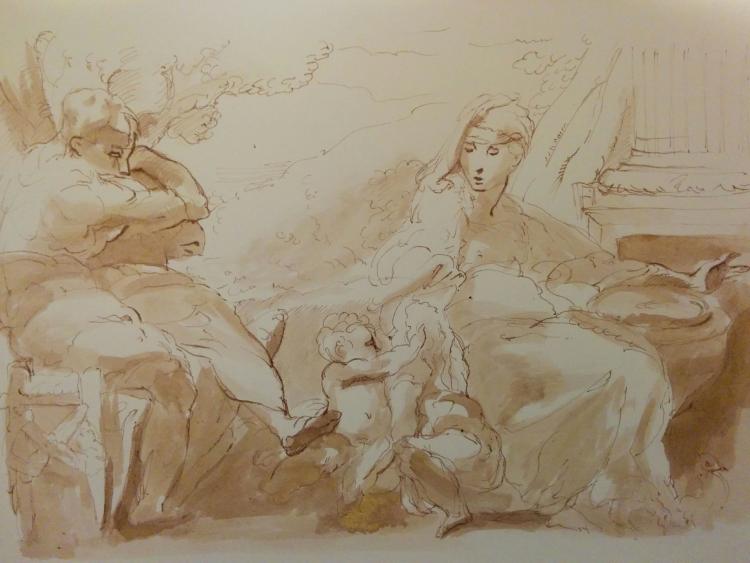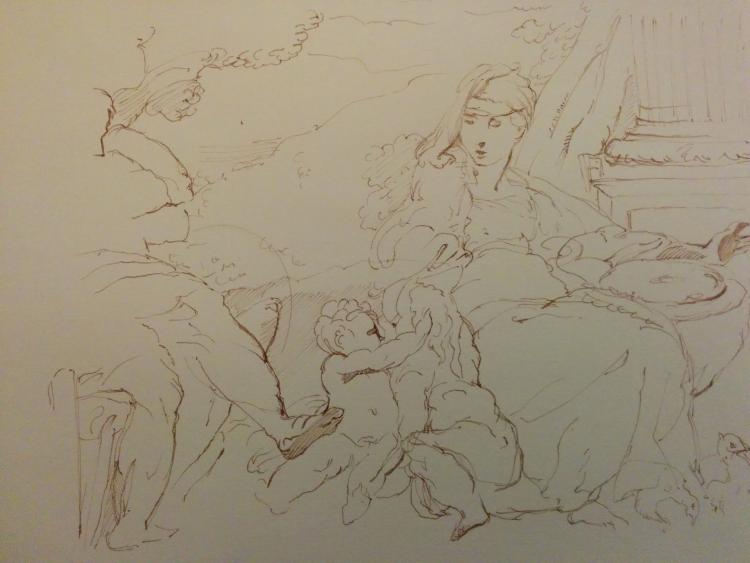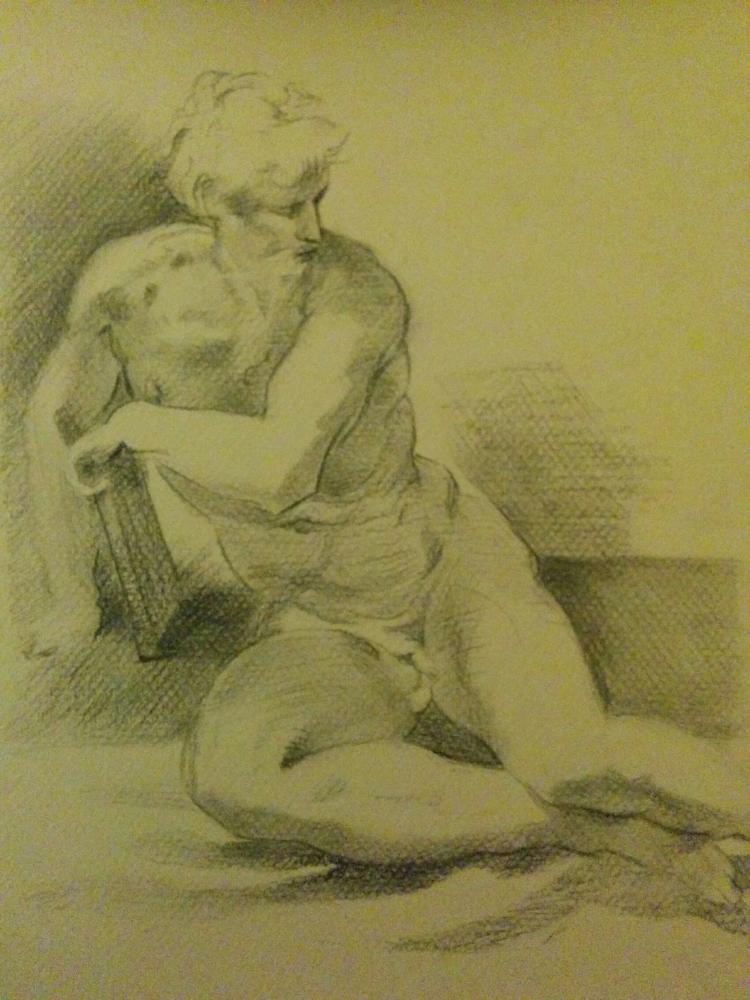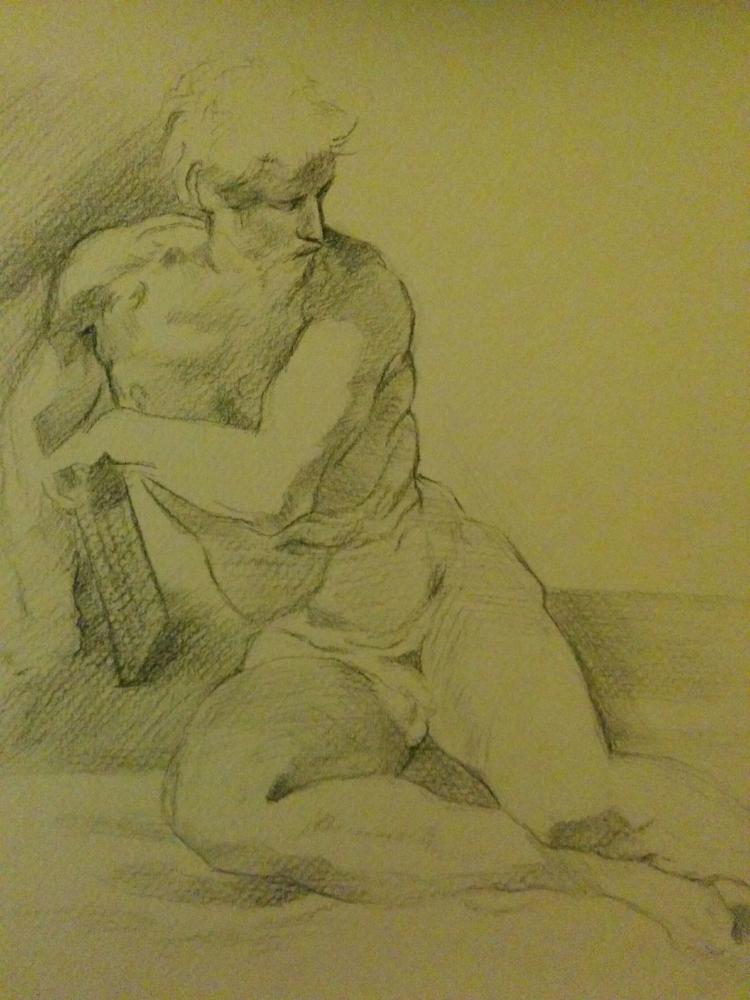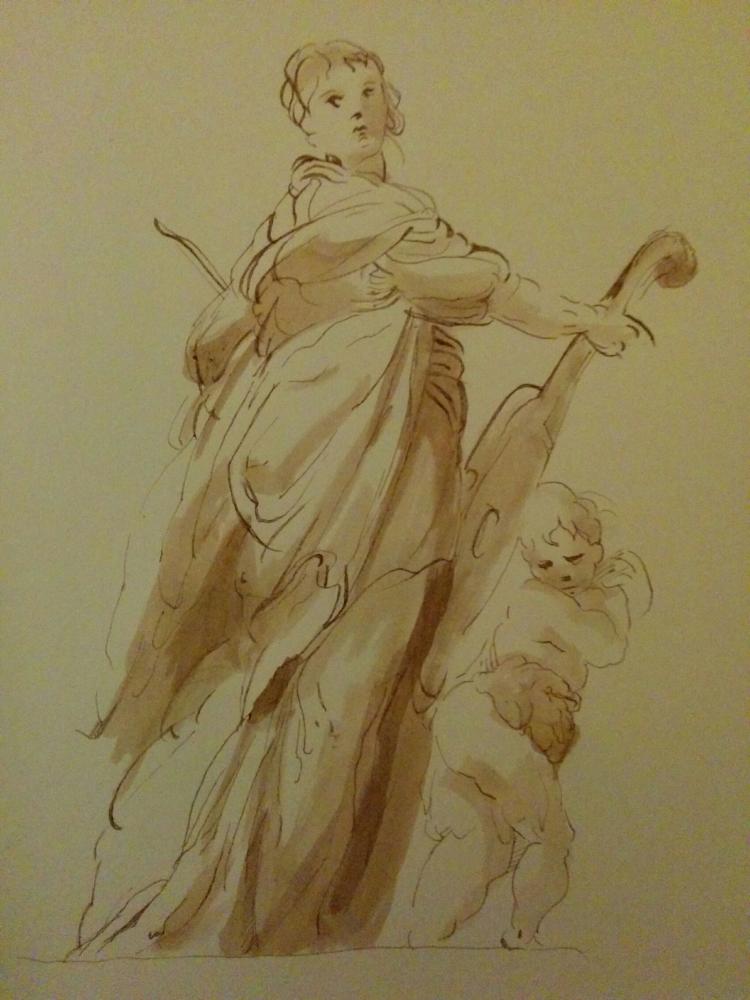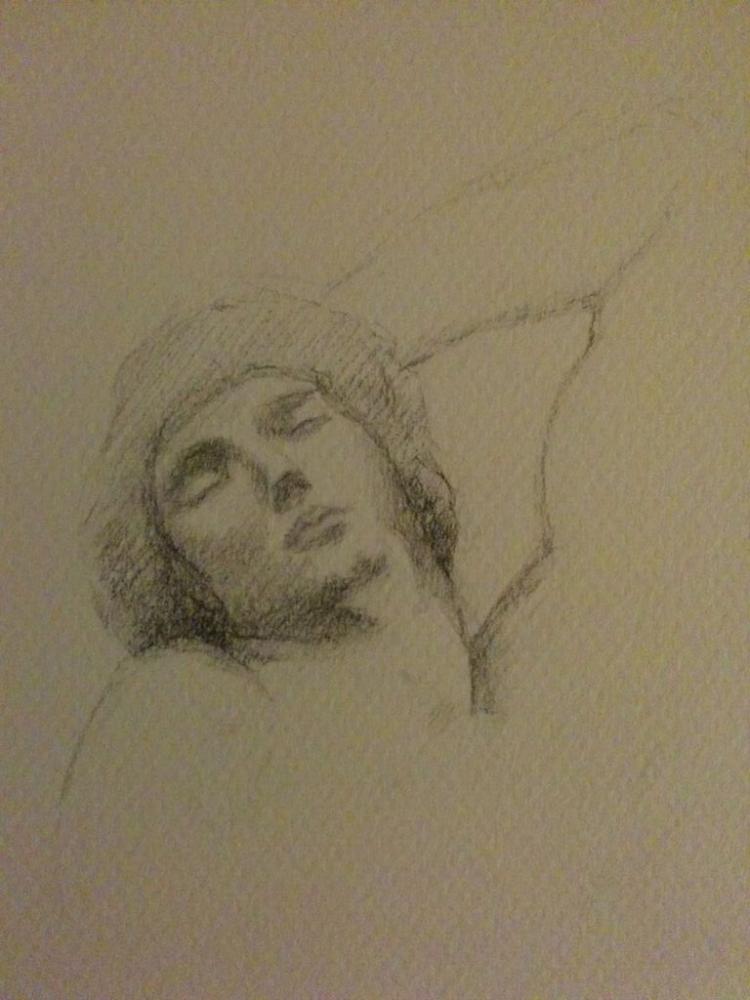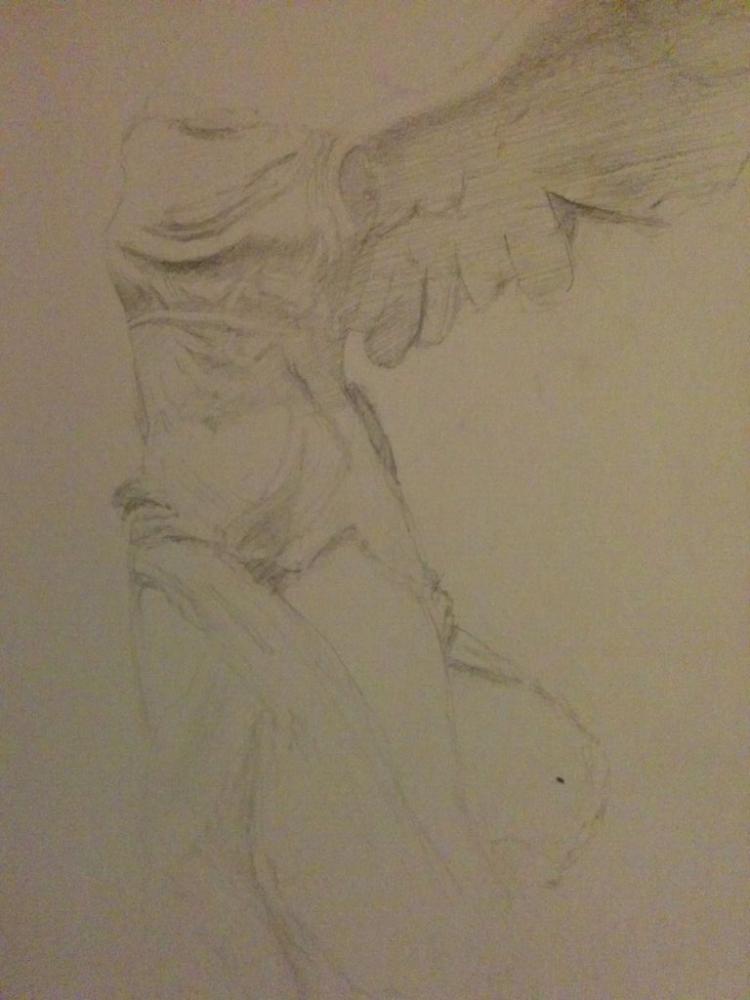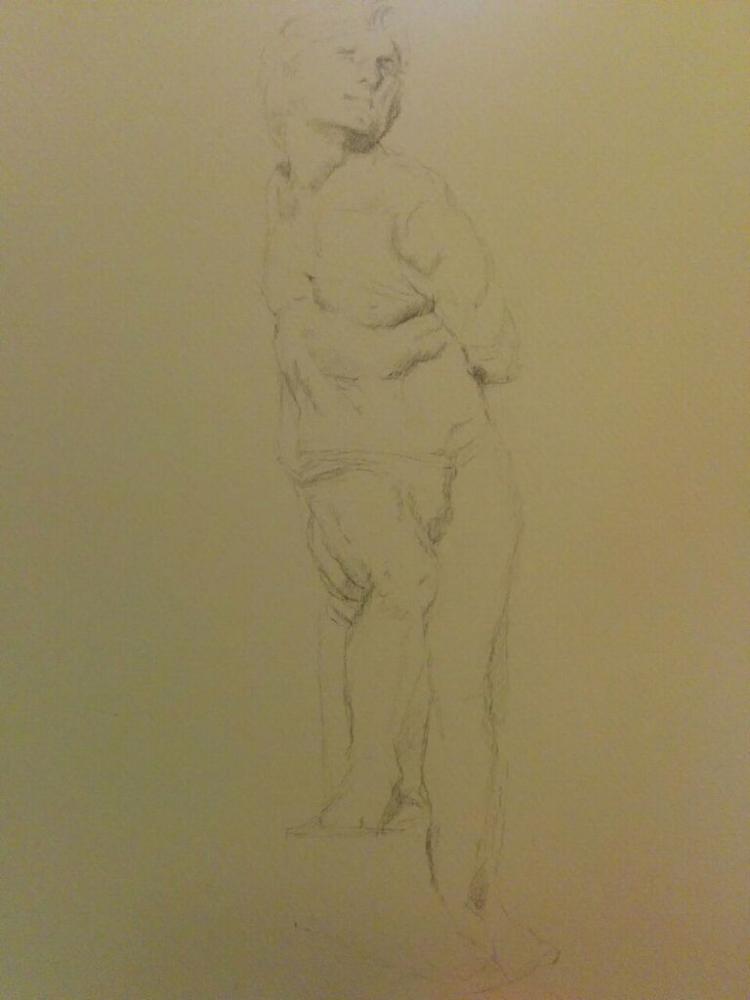It was a sunny day in Paris so I decided to go to the Musee de l'Orangerie to look at the Monets under good light. There are two rooms each containing four large panoramic views of water lilies. They are similar to the ones I saw at MoMA in New York, but it was mercifully less crowded.
I set off, ready to feel some kind of transcendent admiration and to be thrown into an exalted and contemplative calm when I got there. Actually, I accidentally achieved this state of nirvana on my stroll through the Tuileries, soothed by the sun, enriched by a morning with Victor Hugo's Les Misérables, and glutted with baguette, cheese and coffee. By the time I got to Monet, I hadn't any higher state to move in to.
And so the enraptured soul took a breather and gave the reigns over to the critical faculties for a bit.
I felt like I couldn't give myself in to the paintings. Whilst the beautiful colour harmonies, the textures, the immersive scale were not lost on me, I couldn't help but think how far short all of our art falls of the nature they seek to depict. Yes, there is something of an impression of water, reflections, willow trees, foliage, lillies in these paintings. But is that impression enough? Sometimes it is, but if you have just walked past a string of ornamental ponds glistering in the sunlight to see those pictures, you can't help but notice how absurdly different the two experiences are. In fact, the impressions of the real pond and the real light and the impression of the painting are almost wholly incongruent. Outside, there is multiplicity, movement, potentiality, meaning, sensation, wet, fractal reflections, breezes, tensions, ripples, patterns and counter-patterns, waves inside and on and over waves, depths, life. Inside, there is dried paint on a two-dimensional surface. As someone on TripAdvisor said, it's just 'very expensive wallpaper'.
Now this isn't my criticism of Monet. I don't know how else you can hope to represent water with paint. This is a recapitulation of the thoughts I have been having about the way we have to think to appreciate art. We have to forget the real world and take the art on its own terms, and build up from that. We have to accept the system of art, understand it, understand the rules and the decisions of the artist and the hurdles that had to be overcome to make it. The minute we try to compare artwork with the reality it descends from we realise there is no comparison to be made; the two are too different in every way.
This is not a sudden disaffection from art. It is a refinement of how I understand our relationship with it. I've always known it is an artificial system that keeps us busy and takes our mind of things (like sport, music, jobs, pets, politics), and that's okay. In fact, it's a pretty good distraction, and when it works, it works well. So I plunged myself gladly back into the system and went to the Louvre for the quiet of the late night opening. I saw antique bronze statuettes, and finished off the half of the Grande Galerie that I didn't look at before. Everything was quite in order, and I had the appropriate number of profound thoughts and sensations.
All that cogitating and egotistical, self-serving dilettantism over, I returned home for some exceptionally sloppy work on my drawing. I went through the motions, not thinking or applying myself properly. I don't feel engaged with it. Much more interested in all the literature I'm reading at the moment. Between art and literature, what can capture life the better? What is the more creative? What can move you more? Books! Books, I'm sure of it. Literature has the fourth dimension, art (with some exceptions) does not. You can be carried away, sucked into an alternate life that unwinds before you. What is more powerful than narrative?
I finished listening to The Red and the Black. What a terrific read, I'm so glad to have been made aware of it. It's not the kind of thing I would ever have thought I would enjoy a few years ago, when I was reading more or less exclusively non-fiction, eager only to learn facts and scorning anything that was made up.
Now I see that there are just as many facts in novels, they are just presented differently. There are human truths, psychological insights that ring true across the ages. When you read a character who seems real, who acts in fictitious situations in a believable and consistent way, well then you are being shown a mirror to your own nature in which, should you choose to look, you can see your own traits and dispositions and desires and flaws.
A novel is a mirror carried along a high road. At one moment it reflects to your vision the azure skies at another the mire of the puddles at your feet. Stendhal - The Red and the Black
There was so much about love that rang true with my own experiences. I wish I had read it when I was younger. There is much to be learned for the young man! Machiavellian scheming and manipulations both on the part of the lover and the loved, their actions and reactions so perfectly captured.
I went back to the Louvre with reinvigorated spirits. Having been immersed in French literature of the 19th Century, I decided to have a look at some of the art. I rediscovered Corot. Lovely seeing the influence of Constable going through him and being advanced all the way into a prefiguration of the impressionists. Lovely clear, simplified, bold and thoughtful work.
I keep having that thought about whether there is anything left to say in literature or to portray in art or not. It's all been done so incredibly well before. The more you explore, the more works you read or the more art you look at, the less you feel that there is anything left to express. Do we really need any more? It is a moot point of course, because we have the urge, the need, to create, whether or not the things we create need to be created.
I forgot about the drawing today until it was late and I'm too tired to think properly. It's a complex composition and I couldn't really focus on it. Another Parmigianino ink drawing that I saw at the exhibition. I'll finish it and add the ink wash tomorrow.
I have felt very fatigued today, despite (or more probably, because of) staying in bed till mid-afternoon. Warmth and ease and the Stendhal audiobook have been so seductive that I had to actively drag myself out of the house to try to make the most of being in this city. Privilege is a burden! Guilt of squandering a good thing. When I lived in London I wouldn't think twice about spending the whole day at home, but when I'm here ostensibly to enrich my soul (and paying for it) I feel I can't be as lazy as I am naturally inclined to be.
Even so I left the Louvre earlier than I intended because I felt like I was going through the motions of looking at the art rather than really responding to it and enjoying it like usual. Part of the problem no doubt is that I can't throw myself into enjoying anything fully at the moment because I feel a constant nagging guilt about the weight of work that I should have done but just can't force myself to start. It's pathological!
Finished off the charcoal study.
I realised shortly after writing yesterday's post that the quotation from Moby-Dick about enjoying the warmth of a bed all the more when you can feel the cold outside also has a bearing on the feelings I had yesterday about the inadequacy of art to express the vitality of life. Perhaps it is a function of art to make us notice, appreciate, relish and delight in life all the more by virtue of its contrast to the unreality of art. Perhaps I was primed to love the life moving before me because it stood out in such vivid relief from the dead work behind it. Art is the contrast we need to see life in its richest colours.
I read Candide today, and have started Stendhal's The Red and the Black whilst drawing today's sketch (another Parmigianino, this time a life drawing).
Candide was a surprise for me. It is short, fast, thinks itself very funny, and has an agreeable dose of philosophical musings. I agree with the conclusion.
“Let us work,” said Martin, “without disputing; it is the only way to render life tolerable.”Voltaire, Candide
In this case, work is tending a garden. Whatever it is, it is absolutely critical to strive after an occupation of some sort, some activity that blossoms to fill your time and fill your mind. You have to keep busy, even artificially busy. You have to have projects demanding you exist into the future. Otherwise there is the drag of ennui, the fall into depression, the threat of thinking, of realisation. No good! Distract yourself! Turn away! Go about your business!
Just finished Madame Bovary. It's insistently unremitting, a tightly-spun tragedy so utterly bleak that it has to be either genuinely cheering in a cathartic way or utterly and crushingly depressing. To get to the 'oh at least my life isn't as bad as all that' finale requires a fairly robust disposition, and I'm not sure I could struggle through the repeated snares of woe if I were in my usual equivocal spirits. It's a very fine book though, very neatly and compellingly written.
Took another little trip to the Louvre to look over the Italian paintings at a more respectful pace. Highlights were Perugino, Da Vici, Raphael, Ghirlandaio and the Virgin of Humility by Jacopo Bellini. I'm always drawn to the softness, tenderness and delicateness of the touches and caresses of the hands in his paintings. The others were all either beautifully coloured, beautiful girls or beautiful fabrics.
Such a serene blue in Da Vinci's Virgin and Child with Saint Anne, such lovely faces. I stood contemplating it for some time. I was transfixed by the cheeks of Saint Anne, by how sensitively modelled they are. Whilst gazing raptly in my self-congratulatory, well-done-you're-looking-at-something-important way, my view was interrupted by a young girl being carried by her mother. As they walked past, obscuring the painting, I felt an instantaneous, lurching disorientation between the beauty that art can attain and the unapproachable beauty and realness of reality. I saw her little living face, moving, thinking, expressing, changing, so truly precious, unique and irreplaceable and so full of an infinity of life. Immediately I felt how profound the gulf is between the vitality of life and the inertness of the flat canvas, and suddenly the world's greatest paintings felt instantly and lamentably irrelevant.
No matter how close to perfection the arts climb -- and that painting is up in the highest of heights -- there really is absolutely no similarity with the fullness of the real world. It is only convention and habit that make it possible to fool ourselves that there is some equivalence to be made, when really there is nothing but the dimmest and faintest of echoes between the two.
Methinks that in looking at things spiritual, we are too much like oysters observing the sun through the water, and thinking that thick water the thinnest of air.Herman Melville, Moby Dick
It's the difference between the mild discomfort of reading about the agony that drives someone to commit suicide by arsenic in Madame Bovary and experiencing for yourself the untellable dread of the void itself. One is but the faintest possible echo of the other, which would eclipse and annihilate its immeasurably weakened impression utterly.
But sometimes perhaps these dim echoes are all we can cope with. The beauty and the complexity and the suffering and the confusion of the real world are too truly and tremendously overwhelming that we need to recast them into immutable artworks that we can contemplate and unravel and begin to understand.
I'm loving my time here in Paris, even more so than my month in New York. Perhaps it's because I have my own apartment, and it is furnished by someone who reads a lot and owns an iron and ironing board. It feels like my own place. Everything is easy, the city is elegant, calm and welcoming, and being less than ten minutes walk from the Louvre is a privilege and a thrill.
I luxuriated in bed until long past midday today, listening to the audiobook of Madame Bovary, which I am devouring and enjoying immensely. I don't think I would be mentally equipped to deal with the ennui that is flooding her life at the moment if I were reading this at home in changeless, in-gazing Suffolk; but here in the heart of Paris my spirit is uplifted and I can pierce through to the rarefied, active world that Madame Bovary is seeking for. It exists!
Trouble is the fulfilled life of a dream-chaser comes at a cost of several thousand euros a month, and you've got to get them from somewhere. Perhaps the misery of scraping together money is not a universally bad thing though, as it makes the languid days of sensation-seeking all the more sweet in contrast. It's like enjoying a warm bed even more when you can feel the cold air outside it:
The clothes well tucked around us, leaning against the head-board with our four knees drawn up close together, and our two noses bending over them, as if our knee-pans were warming-pans. We felt very nice and snug, the more so since it was so chilly out of doors; indeed out of bed-clothes too, seeing that there was no fire in the room. The more so, I say, because truly to enjoy bodily warmth, some small part of you must be cold, for there is no quality in this world that is not what it is merely by contrast. Nothing exists in itself. If you flatter yourself that you are all over comfortable, and have been so a long time, then you cannot be said to be comfortable any more. But if, like Queequeg and me in the bed, the tip of your nose or the crown of your head be slightly chilled, why then, indeed, in the general consciousness you feel most delightfully and unmistakably warm. For this reason a sleeping apartment should never be furnished with a fire, which is one of the luxurious discomforts of the rich. For the height of this sort of deliciousness is to have nothing but the blanket between you and your snugness and the cold of the outer air.Herman Melville, Moby-Dick
I went back to the Louvre, went around the Parmigianino drawings exhibition again, and also took a stroll through the Grande Galerie. I didn't linger over anything, as I will be returning to pay due respect to the works there over the next few days. Suffice to say the Raphaels and Leonardos I stumbled over were enough to quicken the pulse and dampen the eye.
I had another go at pen and ink, this time working from one of the Parmigianinos from the exhibition. Putting the wash on at the end is the most fun part, when light and shade and volume suddenly spring out in seconds.
I treated myself to the Parmigianino exhibition today, which was the main excuse I used to come to Paris in the first place. The pen and ink drawings were an unanticipated pleasure. Such a different style from the others I have been looking at recently -- he seems more than others to not change his technique too much between media, and makes sketchy, searching lines with the ink as if he were drawing with an erasable medium. Beautiful work, and lots to reflect on.
I took a tiny study of a tiny red chalk drawing of a young man he did. You get no sense of scale when you look at reproductions, which is another pleasure of seeing works in real life. Most of the images are far smaller than I had thought, which makes their delicate handling even more precious.
Finished Moby-Dick today. Wonderfully-paced, a perfect blend of a gripping yarn, allegory, philosophy and poetry. There is an oceanic inscrutability, a feeling of being confronted by a vast, unfathomable world that no matter how deeply you contemplate it you can never hope to understand or control it.
Despite devoting most of the book to what it means to be a whale and a whaler, despite giving a complete catalogue of whaleness, lingering over its habits and history, with pages and pages of anatomical, physiognomonical and mythological description, the leviathan remains just as profound and distant and terrifying as it was at the start.
Dissect him how I may, then, I but go skin deep; I know him not, and never will.Herman Melville - Moby Dick
There's also the dual essence of man. Always conscious of it in museums and galleries. There's the rational pleasures of the mind contemplating the works of art and learning the history and enjoying the aesthetic, then there's the pulsing humanity that moves past and distracts you with its pretty girls never to be known. Feel, feel, feel! Forget the sculptures, follow the feelings! But I never do, and that's why there is so much escapism in reading about Captain Ahab, someone so utterly given over to his irrational animal side, plunged in to an all-consuming madness.
Here's food for thought, had Ahab time to think; but Ahab never thinks; he only feels, feels, feels; that's tingling enough for mortal man! to think's audacity. God only has that right and privilege. Thinking is, or ought to be, a coolness and a calmness; and our poor hearts throb, and our poor brains beat too much for that.Herman Melville - Moby Dick
Enjoyed the Friday night late-opening of the Louvre. Focused on sculpture again, and took sketches of Michelangelo's Dying Slave and the Winged Victory of Samothrace. The works are incredibly moving. I saw one girl crying in front of the Victory. It's impossibly powerful. My sketches are miserable but I value the time it gave me to stand in front of the works and concentrate on them. I just wish there were fewer people around, everyone bustling to take a selfie.
A fabulously busy, arty, Parisian sort of day. Lots of coffee, bread, cheese, cakes, walking, sun, art. I went back to the Louvre and looked at Italian and Greek sculpture for a few hours, before going across town to a vernissage of some contemporary art in a small gallery, featuring some kinetic art by Elias Crespin, which was rather hypnotic.
Going from sitting in front of Michelangelo's rebellious slave and taking a study to talking to the artist behind a sculpture of rising and falling metal beads on nylon string was quite a mental leap.
What happens when you buy one of these kinetic sculptures and the motors fail? Are you covered by some kind of warranty?
I spent most of the day with a friend who lives in Paris and has not read Proust.
The artist who gives up an hour of work for an hour of conversation with a friend knows that he is sacrificing a reality for something does not exist (our friends being friends only in the light of an agreeable folly which travels with us through life and to which we readily accommodate ourselves, but which at the bottom of our hearts we know to be no more reasonable than the delusion of the man who talks to the furniture because he believes that it is alive).Marcel Proust - In Search of Lost Time
The thing is -- and Proust knew this too -- idle conversation is never really wasted, it's a vital part of the human condition. Socializing is part of the hierarchy of needs, and to neglect it will be detrimental to everything else you try to do. Like everything, you just need to dose it right. Too much, you don't do any work, but too little and you risk going bonkers. That is my concern about becoming a hermit artist in a cottage somewhere; attractive though it may be, the lack of sociability would probably grind me down and I'd achieve even less than I would living a normal life with normal human interactions. The middle course! The compromise! The balance of work and play that actually optimises your ability to work.
I went to the Louvre for the first time today. In grandness, size, and elegance, I have never seen anything like it. I can't begin to comment on the collection yet, as I restricted myself to just a few rooms to start with. But from what I already know is there, I'm inclined to think this might be the greatest gallery on earth. There's certainly nothing in London that can compete, and the Met in New York has none of its refinement, nor the calibre of masterpieces. Very, very excited to be here.
Did another pen and ink drawing, this time after an angel sitting on a cloud by Tiepolo. I'm drawn to it because I caught sight of the Nike at the top of a flight of stairs at the Louvre. Too tired today to do it justice, but can't get the wings out of my head. So a drawing of an angel it is!
